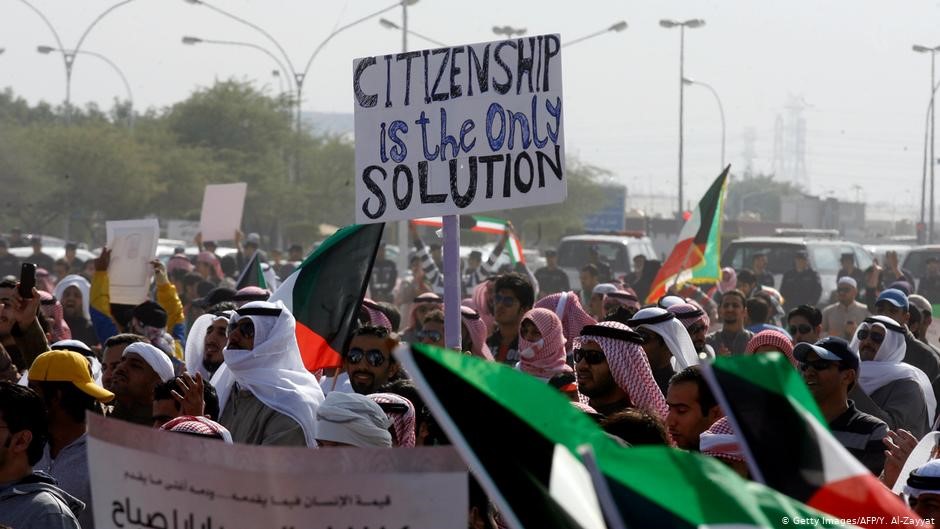
Kuwait | Amend repressive legislation and provide a safe and enabling environment for defenders
Human rights defenders and civil society actors should be able to carry out their work in a safe and enabling environment, without fear of threats, attacks and arbitrary arrests. In light of the upcoming Universal Periodic Review of Kuwait due to take place in January 2020, ISHR calls States to urge the Kuwaiti government to repeal repressive legislation and to refrain from criminalising the legitimate activities of human rights defenders.
On 29 January 2020, Kuwait’s human rights record will be reviewed as part of the 35th session of the Universal Periodic Review (UPR). ISHR is calling on States to urge the Kuwaiti government to refrain from restricting and criminalising the legitimate activities of human rights defenders (HRDs), including women human rights defenders (WHRDs) and Bedoon HRDs, and to ensure a safe and enabling space for civil society.
During the second UPR cycle in January 2015, Kuwait accepted 13 recommendations on civic space, specifically on the situation of HRDs, and the protection of the rights to freedom of expression, association and peaceful assembly. Yet, HRDs continue to face severe restrictions, with WHRDs and Bedoon activists facing heightened threats. HRDS, journalists, bloggers, and writers face arbitrary detention, interrogation, torture, judicial harassment, prison sentences (including following trials in absentia), travel bans, defamation campaigns, torture and other forms of inhumane and degrading treatment, as well as being stripped of citizenship.
A number of laws in Kuwait highlight the restrictive nature of civic space in the country. Examples of this repressive legislation include the 1979 Public Gatherings Act, the National Security Law of 1970, the Cybercrime law of 2015, and the 2006 Press and Publications Law. These laws are often arbitrarily used to punish individuals for allegedly inciting to “overthrow the regime in the country”, ban public assemblies, provide police with the power to disperse protests with the excessive use of force, arbitrarily arrest individuals, restrict press and internet freedoms, and curtail the work of HRDs.
Also of particular concern is the occurrence of reprisals for those who work with United Nations (UN) mechanisms. Those who engage or seek to engage with the UN have been arbitrarily arrested and prevented from travelling. As a result, Kuwaiti HRDs are hesitant to engage with UN mechanisms due to fear of reprisals. ISHR urges the Kuwaiti government to put an end to all acts of reprisals against those who engage or seek to engage with the UN.
Bedoon rights’ defenders face targeting and discrimination by the authorities, including by blocking or postponing the renewal of essential national identity documents unless activists and their families declare, in writing, that they would cease political activities. WHRDs are also frequently targeted and face increased risks as a result of their work, such as defamation, stigmatisation, social pressure, gender and sexual-based violence, as well as marginalisation and discrimination.
During Kuwait’s UPR pre-session on 11 December 2019, civil society organisations recommended that Kuwait take measures to prevent arbitrary detention, ensure the independence of the judiciary, take meaningful steps to strengthen the rule of law in line with international standards and to ratify international human rights treaties.
Read ISHR’s joint briefing paper and recommendations on human rights defenders with the Gulf Center for Human Rights, CIVICUS, and MENA Rights Group.
The briefing paper outlines key recommendations for States to make to Kuwait at the UPR, including:
- Refrain from restricting and criminalising the legitimate activities of HRDs, including WHRDs and Bedoon HRDs.
- Ensure a safe and enabling space for civil society and HRDs, by ending all forms of harassment against defenders, including judicial and administrative harassment, and put an end to all acts of reprisals against those who engage or seek to engage with the UN human rights mechanisms.
- Repeal all laws and policies that restrict HRDs’ activities offline and online, including the Cybercrime Law of 2015 and the Press and Publications Law of 2006.
- Amend the National Security Law of 1970 to fully guarantee the rights to freedom of expression and opinion in line with international standards.
- Amend the 1979 Public Gatherings Act, and the 1962 NGO Law to fully guarantee the rights of freedom of association and peaceful assembly in line with international standards.
- Immediately and unconditionally release all HRDs detained in relation to the exercise of their rights to freedom of expression, association or peaceful assembly, whether online or offline, in line with international standards.
- Demonstrate strong, high-level political support for HRDs through public statements by State officials recognising and supporting their vital and legitimate work.
- Publicly recognize the legitimate role of women HRDs and those working on women’s rights. Adopt measures ensuring their full protection from violations by state and non-state actors.
- Facilitate the visits of the Special Rapporteur on the situation of HRDs and the Special Rapporteur on freedom of opinion and expression, and the Special Rapporteur on the rights to freedom of peaceful assembly and of association.
- Take all necessary measures to bring the National Human Rights Institution into full compliance with the Paris Principles.
Contact: Salma El Hosseiny <[email protected]>
Photo: Getty Images Yasser Al-Zayyat
